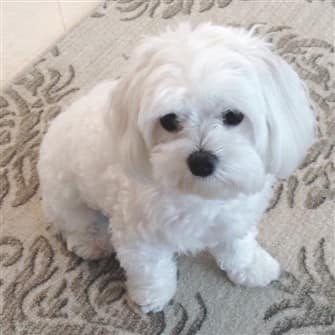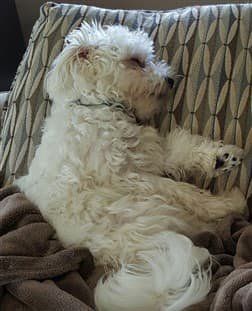Maltese Lethargy
Max, at 22 months, photo courtesy of Sally Burriesci
Overview
The Maltese is a fairly active breed; however, puppies and dogs cannot be 'on' all of the time. A healthy Maltese will have proper levels of both having energy and resting.
So, while it is normal for a Maltese to need to rest periodically throughout the day, this section will focus on when a Maltese acts more lethargic than normal. This may include not wanting to engage, not having enthusiasm to play, or resting and sleeping more than expected.
Please note:
PetMaltese is reader-supported. Some of the product suggestions on this page are affiliate links. As an Amazon Associate we earn from qualifying purchases. This is at no extra cost to you and helps us continue creating useful content.
Normal Activity Levels
How active your Maltese is and how often he rests and sleeps will depend quite a bit on his age; but also the type of stimulation that he receives.
Puppies: Young puppies are both balls of energy and sleeping machines.
It is very common for Maltese puppies to be very revved up; however, they can just as quickly poop out. It is a bit like a roller coaster. They will take quite a few naps throughout the day, with these lessening as they mature during the first year.
If you count both nighttime sleeping and naps taken, a puppy will be asleep more than he is awake. New Maltese pups will sleep 18 to 22 hours and this will gradually decrease to 14 to 16 hours at the 1 year mark.
There are some concerns for Maltese puppies that have marked lethargy, and we will touch on this ahead.
Adults: For Maltese dogs 1 year to 7 or 8 years old, there is more even-keeled energy levels, though it is normal to rest during down times.
An adult Maltese often mimics the vibe of the household. If there is lots of activity and commotion, he will be alert. If the house is very quiet and there is not much stimulation, he may become subdued. In some cases, lethargy for an adult will be due to a need for more interaction and purpose.
Reasons for a Maltese Puppy Acting Lethargic
Normal Spikes and Dips:
As we touched on before, it is common for puppies to have lots of energy at some times, but then needing to doze at others. And many times, a puppy will not try to make it to his bed or resting area; he'll just stop in place and put his head down.
There are some puppies that exert so much energy in such a short time frame, that they'll fall asleep with their head on the food dish.
Eco, photo courtesy of Anna Leong
As long as your Maltese is active and alert in between his rest and sleep phases, there is usually nothing to be concerned about.
Reasons for Lethargy with Maltese of All Ages
1. Hypoglycemia:
This refers to a rapid drop in blood sugar levels and is very common with toy breeds like the Maltese. This affects young puppies in particular but can also develop in older Maltese dogs as well, since it is size that plays a role.
In many cases, a puppy or dog will have a minor issue in which he quickly rebounds. But other times, moderate or severe hypoglycemia can develop which warrants immediate intervention.
Hypoglycemia has several triggers, including stress (even 'good' stress such as moving to a new home), and not eating often enough.
Sam, photo courtesy of Melissa Chin
This is one reason why
feeding guidelines suggest free-feeding young Maltese puppies during the first month home (age 8 weeks to 12 weeks) and offering 2 or 3 meals plus snacks for adult Maltese.
Signs of hypoglycemia include marked lethargy, weakness, confusion, trouble holding a steady gait and/or dizziness.
Many would describe the puppy or dog as acting 'drunk'.
What to do:
While moderate to severe cases often need continued treatment at the veterinary clinic, the first step to treating this is to introduce a fast rush of sugar.
This can be accomplished by rubbing a dab of honey on the pup's gums or using a nutritional supplement that comes in gel form.
One such as Tomlyn's Nutritional Gel
 works very well and is also an effective method to offer nutrients to a puppy or even older Maltese that has trouble eating often enough, thereby also helping to prevent hypoglycemia.
works very well and is also an effective method to offer nutrients to a puppy or even older Maltese that has trouble eating often enough, thereby also helping to prevent hypoglycemia.
2. Health Issues:
Puppies and dogs that do not feel well often retreat and rest more than normal. If a condition is coming on or if there has been some sort of an injury, a Maltese will be much less enthused to interact, play, or exercise.
Even if your Maltese shows no signs other than lethargy this should not be ruled out. In addition, even if your puppy or dog has just recently seen the vet, this should not be ruled out; something may have developed from then to now.
With a wide range of health issues, it is very common for lethargy to develop as one of the first symptoms before other clinical signs appear.
There are numerous health issues
that have lethargy as a sign, including but not limited to infections (including parvovirus, distemper, and heartworm disease), heart issues, liver issues, and canine diabetes.
In addition, emergency issues such as ingestion of a toxin or internal blockage can cause sudden lethargy.
What to do:
If you have strong suspicions of an issue, do not delay a check up. If you are not sure if there is a problem, many owners will take a 'wait and see' approach. While this may be okay if a Maltese just seems a bit off, a check up will be warranted if signs worsen, if there are new symptoms, and/or if other approaches are not applicable or do not help (more ahead).
3. A Change in the Household or Schedule:
-min-251x335-1920w.jpg)
4: Boredom or Low-Vibe Household:
These two elements go hand-in-hand since the fix for them is the same.
In regard to boredom, this is a top reason for lethargy without health issues or any other obvious root causes.
Many dogs are not happy just 'being there'. There needs to be interaction and stimulation in order for the Maltese to feel emotionally balanced. If not, the dog can become sullen.
This is not uncommon in households in which owners are very busy with family obligations and/or household tasks. Before you know it, the day is nearing a close and a Maltese has had very little engagement.
In addition, one of the leading causes of boredom is when a dog is left home alone; an unavoidable part of dog ownership. There are quite a few steps that you can take to resolve separation anxiety issues, including setting up the right environment, and supplying the right toys and aides (more ahead).
A low-vibe household closely
mirrors this issue. There is nothing wrong, per say, with a quiet house. In fact, a chaotic house can bring about just as many, if not more, problems. However, when there is very little happening, this often tumbles into the issue of a Maltese simply not having enough to do, see, or hear.
What to do:
Fortunately, there are many effective remedies to perk up a Maltese that is lethargic due to lack of stimulation:
1. Keep up with exercise requirements. Purposeful outdoor exercise
is certainly important for physical health. However, it is also important for emotional health. Dogs can quickly develop the canine equivalent of cabin fever. And, not being able to 'be a dog' via smelling new scents, hearing new sounds, and seeing his extended surroundings can be very stifling.
So, walking your Maltese twice per day for at least 20 minutes each session plays a role in fixing lethargy issues.
2. Bring your Maltese with you, when you can.
If you find that you or other family members run errands in which they could take your Maltese but do not, it may be time to reconsider this.
Maybe your Maltese looks perfectly content just sitting around. But maybe if he was allowed to tag along, he'd be a lot happier. And it may just stop a boredom problem that was silently brewing.
When a dog is taken on a short trip, this can really perk him up. It can make him feel like he's on a mission and that he has a purpose.
Be sure to have a safe car seat for your Maltese. In addition, you may find many destinations are suitable for keeping your Maltese up near you in a carry sling like the i'Pet Hands-free Small Dog Sling Carrier , while allowing your hands to be free.
, while allowing your hands to be free.
3. Teach commands.
Basic command training, or even trick training for a dog that knows all the basics, can instill a sense of accomplishment and pride that carries over to other aspects of a dog's day.
It's a great bonding experience, it allows a dog to focus on something new, and creates windows of time each day that a dog can look forward to.
Whether you'll be working on an essential command such as 'Sit' or 'Come' or taking on the challenge of teaching your Maltese to shake hands or retrieve objects, a book like 101 Dog Tricks: Step by Step Activities to Engage, Challenge, and Bond with Your Dog
 can be a great way to learn how to be a good trainer in order for your dog to be a successful student.
can be a great way to learn how to be a good trainer in order for your dog to be a successful student.
4. Offer a great supply of interactive toys or even a special treat-dispenser. Toys that dispense treats can keep a dog quite entertained and are also great for times that you are not home to help ensure your Maltese eats. You can fill these with dry kibble, or to make it more tempting mix in a bit of peanut butter, mashed banana, or even a splash of fish oil.
For this, the Busy Buddy Barnacle Toy
 is a great one; this has orbs of varying sizes that hold kibble and works well for puppies and dogs of all sizes.
is a great one; this has orbs of varying sizes that hold kibble and works well for puppies and dogs of all sizes.
And, an interactive toy can allow your Maltese to have some fun even if you're busy or not at home. Great choices are those that speak or let out funny sounds like the Pet Qwerks Blinky Babble Ball
 that lights up and emits both silly noises and funny sayings when its pawed or nosed.
that lights up and emits both silly noises and funny sayings when its pawed or nosed.
5. Take time to engage your dog for short sessions throughout the day. Many dogs laze around simply because their owners are busy with other things or lazing around themselves. But, you may be amazing how a dog can perk up just by their human asking if they want to play. And, the one game most dogs love is fetch which can be done just about where, both indoors and out, with a short 15 minute session all it takes to make a dog happy.
Are You a Member Yet?
Become a free PetMaltese Member
- This will allow you to receive a friendly reminder when new pages of Maltese info are added to the site. You will also be able to submit photos of your adorable Maltese to be added here, and be able to suggest a topic for us to write about.
Spotlight Article
There are 5 steps to keep a Maltese ultra white, while maintaining excellent skin and coat health.

-min-450x169-1920w.jpg)



-min-335x316-1920w.jpg)

-min-252x335-1920w.jpg)


